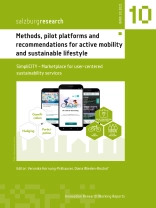In the past decades, European cities have set ambitious goals for low carbon transition, but regional sustainability services (RSUS) lack an active user base. Only 15% of consumers take sustainability of these into account during a purchase and ‘rebound effect’ can reach 80%. At the current pace, RSUS will fail to develop into sustainable business models and cities’ efforts remain insufficient to meet targets set for 2050. The European project ‘Simpli CITY’ (JPI Urban Europe; running from 10/2018-6/2021) aims to boost the digital competences of the urban communities in Salzburg, AT and Uppsala, SE. Both pilot cities, Salzburg and Uppsala, are so-called smart cities with different action fields, targets and coordination offices.
This report informs about the activities and results of Simpli CITY in which a hybrid approach was developed, using both physical and digital participation and incentive methods and tools. Simpli CITY examined how to increase the usage rate of regional sustainability services and how to drive the community towards these services by means of two novel web platforms and applications (‘Stadtmacherei Salzburg’ and ‘Cykla med Pelle’). In the long term, they will lead to a better visibility of regional sustainability services. More information about the project and its result can be found at: https://www.simplicity-project.eu.
Circa l’autore
Mag. Diana Wieden-Bischof is innovation researcher and project manager in the department of ‘Innovation and Value Creation’ at Salzburg Research. Her research focus lies particularly in the early stages of innovation. Here, the involvement of a crowd, their active participation in innovation processes, and diverse motivational factors are the focus of her work. Furthermore, she is particularly interested in new approaches to innovation management and the use of various open innovation methods and tools.












